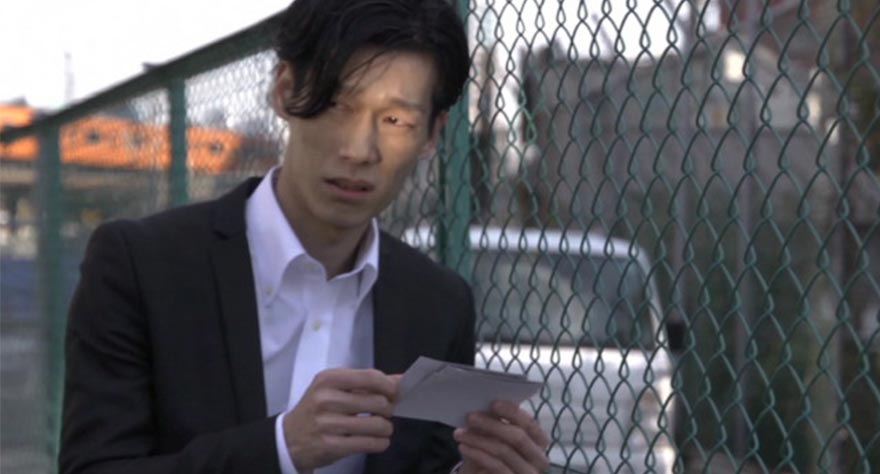ND/NF 2015: Ow

In the first 30 minutes of Ow, Yohei Suzuki’s debut feature, I was prepared to consider it one of my favourites of ND/NF so far. It’s hard to find a direct comparison to the tonal juggling act Suzuki pulls off, but think of it as the sort of set-up you would see in an episode of Doctor Who. The film opens with jobless, 26-year-old Tetsuo ambling about his family home until his girlfriend shows up to have sex with him. Shortly after doing the deed, both of them get stuck in some sort of trance when they stare at a giant, floating orb that suddenly appears in Tetsuo’s bedroom. And when I say stuck, I mean it literally; the moment they lay eyes on the orb, both of them stay frozen in place. Tetsuo’s father comes home later, barging into his son’s bedroom to make a tearful confession: he was laid off from his job weeks ago, and every morning he’s been pretending to go to work. The reveal gets cut short though, as Tetsuo’s dad also winds up staring at the orb.
From there, Suzuki frantically goes back and forth between thriller and comedy mode as the police get involved. One by one, police officers go upstairs to investigate, only to get transfixed by the orb once they set their eyes on it. This entire first act with the orb is highly entertaining to watch, a kind of fantastically strange and funny sci-fi/mystery that quickly escalates into a morbid comedy of errors. Unfortunately, once the orb goes away and everyone comes of their trance, Suzuki doesn’t really know where to take the story. The police, having no clue how to explain what happened, make up a story for the public, and Suzuki shifts the focus to an amateur reporter trying to expose the cover-up. The problem with this change-up is that Suzuki already showed everything that happened in the first half hour; watching the reporter spend the rest of the film playing catch-up gets pretty tedious to watch by the end. And the ending itself is a bit of a mess, a Shinya Tsukamoto inspired bit of insanity––including one character flat-out referencing Tetsuo: The Iron Man—that doesn’t feel earned compared to the relatively low-key material beforehand.
At least Suzuki never loses the off-kilter tone he establishes from the outset. The strange quirks he employs at the beginning—on-screen captions describing basic stats for each character as they’re introduced, a strange, percussive score, and a bonkers police detective—help set up the bizarre atmosphere permeating the rest of the film. After the orb leaves the picture, everyone unlucky enough to look at it winds up having a side effect where their bodies randomly go catatonic. There’s a point where Tetsuo’s mother and grandmother push the frozen bodies of Tetsuo and his girlfriend around town in wheelchairs, gleefully commenting on how cute the two look together. It’s those kinds of surreal moments that make Ow a film that’s hard to forget, bad story or no.
